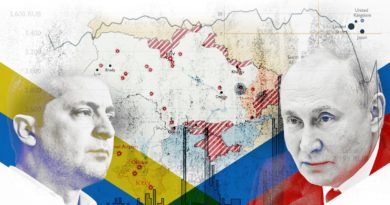Beijing doubles down on Ukraine biolab disinformation

Chinese officials are pushing a debunked conspiracy theory promoted by the Russian military that the U.S. is funding biological weapons research in Ukraine.
Why it matters: As the West has pushed to isolate Putin, “China has insistently sought to shift the focus to the question of U.S. biological weapons labs in Ukraine,” David Bandurski at China Media Project writes.
- Driving the news: Chinese officials raised the topic of U.S. biological warfare research in Ukraine during the March 14 Rome meeting between U.S. national security adviser Jake Sullivan and top Chinese official Yang Jiechi, shocking U.S. officials present at the meeting, the Guardian reported Friday.
What they’re saying: Chinese state media continues to push the disinformation, warning of “risks” posed by the supposed facilities and claiming the U.S. was breaking international law.
- White House spokesperson Jen Psaki on Twitter called the claims “preposterous.”
- China’s Foreign Ministry spokesperson Zhao Lijian said on March 8 that the U.S. must “give a full account of its biological military activities at home and abroad and subject itself to multilateral verification.”
- Chinese state media outlet Global Times published an article on March 10 citing Russian Defense Ministry claims that U.S.-operated labs in Ukraine had used bat coronavirus samples in experiments. Scientists say the studies on bat parasites are routine epidemiological research.
The conspiracy theory also spread quickly on China’s heavily censored social media platforms, which have been scrubbed of pro-Ukraine comments.
- It has also appeared in U.S.-based Chinese language outlets that serve local Chinese communities.
The response: “This is all an obvious ploy by Russia to try to … justify its further premeditated, unprovoked, and unjustified attack on Ukraine,” Psaki tweeted on March 9.
- The European External Action Service, the EU’s diplomacy arm, published a Chinese-language analysis debunking the idea that the U.S. was operating biological warfare labs in Ukraine.
Between the lines: “To anyone paying attention to [Chinese state media] during the early pandemic, this messaging likely feels familiar,” wrote analysts with Miburo Solutions, a U.S. consulting firm focusing on disinformation.
- Zhao, the Chinese Foreign Ministry spokesperson, was also the first high-profile Chinese government official to publicly suggest the U.S. had created the coronavirus as a biological weapon at a research facility in Maryland. Most scientists say the virus shows no signs of being engineered.
- “Considering how widespread this disinformation campaign was, it’s no surprise that the ‘bioweapon’ narrative has been repurposed and aimed squarely at the war in Ukraine,” the Miburo analysts write.
Yes, but: Some Chinese internet users are still criticizing the invasion and Beijing’s response despite the censorship and disinformation, the Wall Street Journal reports.
- After Chinese ambassador to the U.S. Qin Gang published an op-ed in the Washington Post denying China knew in advance of Russia’s invasion, a translation of the op-ed posted to Chinese messaging app WeChat soon garnered hundreds of thousands of comments from people debating and criticizing China’s position.
Go deeper: China takes a page from Russia’s disinformation playbook


